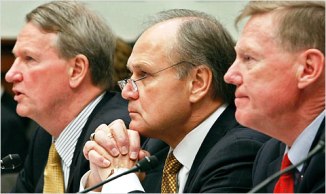Your son comes to you asking for a loan to help his struggling company.

The company has been successful in the past, but due to the current economy, no bank is willing to loan him the necessary funds. So, he now pleads his case with you in an effort to help him return to stability while the economy recovers.
While the loan represents a considerable amount of money, you realize that your son’s company is the largest single employer in your county, and bankruptcy would have a terrible impact on your area.
However, you take notice of the fact that your son arrives at your house in a limo. Further examination of the balance sheet reveals that, during the economic downturn over the past two years, your son has continued to pull down a very high salary. Your son explains that this represents but a small part of the overall budget, but is willing to take a substantial cut in pay and perks.
I’m wondering how Messrs. Wagoner, Nardelli, and Mulally, the CEO’s of GM, Ford and Chrysler would handle such a situation.
During the current economic crisis we have seen many, too many long-established companies fall under the weight of, what’s been described as, truly extraordinary circumstances.
Looking at it from an ethical perspective, any evaluation would have to begin with responsibility. Did management act responsibly? When did they first realize that the crisis had grown beyond the means for them to handle it?
According to a recent CNN poll, six in ten Americans oppose any kind of bailout for the automakers. Many believe that going into bankruptcy is part of a market economy correcting itself. Many more believe, why should we help automakers and not other companies?
But there’s another side to this issue. What would be the long-term cost to the American public if the three automakers filed for bankruptcy? Does Congress have a duty to act to forestall such an action? How many more companies might close and how many more workers would be added to employment lines if they don’t?
Clearly, there are no easy answers, and, sadly, it would seem that there is no way to avoid long-term sacrifice for the both the thousands of employees of the Big Three and the American taxpayer.
Whatever arrangement is decided upon, elected officials have a duty to hold top executives accountable for all aspects of the plan. And part of any agreement should include complete, unquestioned oversight along with regular progress reports from all three CEOs.
If members of Congress do not act in a resolute and responsible way, the American people will have yet another example of broken trust. And given the current climate in Washington, trust is in short supply.
Comments
Leave a Comment











Clearly, I goofed and forgot about my appointment. I called Jason and, hopefully, he’s forgiven me!
You make an excellent analogy in the automaker dilemma. I had a chance to read it while waiting for you today at 10:30. Ethically, I should call to remind you of your appointments so that we are both in line with our values.